|
|
|
Sort Order |
|
|
|
Items / Page
|
|
|
|
|
|
|
| Srl | Item |
| 1 |
ID:
122271
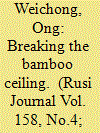

|
|
|
|
|
| Publication |
2013.
|
| Summary/Abstract |
Western intellectual traditions have exercised a strong influence on Asian military thought since the Second World War. Ong Weichong asks to what extent this is still true by comparing Singapore and the PRC, whose professional education systems, and ways of drawing lessons of war from the experiences of others, are significantly different from their Western counterparts - and from each other. He finds that, while Singapore continues to rely on Western thinking, China is developing increasingly unique interpretations of the role of its military forces and of its position within the international arena.
|
|
|
|
|
|
|
|
|
|
|
|
|
|
|
|
| 2 |
ID:
122267


|
|
|
|
|
| Publication |
2013.
|
| Summary/Abstract |
After 9/11, the US introduced a public warning system for terrorism, the Homeland Security Advisory System: the first of its kind in the country. Within months, however, the system was attracting widespread criticism, with questions regarding its ability to adequately communicate risk, its use of colour-coded threat levels, and even its potential to be manipulated for political advantage by the Bush administration. Despite this, the UK introduced a similar system in 2006. Whilst some lessons appear to have been learned from the American experience, in other respects the UK approach is still a work in progress.
|
|
|
|
|
|
|
|
|
|
|
|
|
|
|
|
| 3 |
ID:
122269
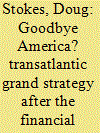

|
|
|
|
|
| Publication |
2013.
|
| Summary/Abstract |
As China rises, the popular wisdom is that the US is in inexorable relative economic decline. A rapid loss of US power would affect the national-security interests of its close allies, particularly the UK. However, Doug Stokes argues that America's decline is not as pronounced as is commonly assumed. Even after the crisis, it remains, fundamentally, economically sound and its strategic power in important parts of the world means it retains the tools to manage a potential 'hegemonic transition'. Nonetheless, the financial crisis has quickened structural shifts in transatlantic relations, which will inevitably have an impact on European strategy.
|
|
|
|
|
|
|
|
|
|
|
|
|
|
|
|
| 4 |
ID:
122266
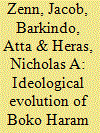

|
|
|
|
|
| Publication |
2013.
|
| Summary/Abstract |
Ideological factors help to define the evolution of terrorist organisations, influenced by the domestic and global political context. Jacob Zenn, Atta Barkindo and Nicholas A Heras examine the ideological motivations that influenced the transformation of Boko Haram from local salafism to international jihadism. They seek to analyse the extent to which, in addition to local grievances and its own internal politics, the ideology of other transnational extremist organisations and Nigerian history and politics have influenced the ideological development of Boko Haram.
|
|
|
|
|
|
|
|
|
|
|
|
|
|
|
|
| 5 |
ID:
122262


|
|
|
|
|
| Publication |
2013.
|
| Summary/Abstract |
Should the UK ultimately withdraw from the European Union, it will have a significant impact on Sweden, a like-minded country that is a member of the EU but not of NATO. Anna Sundberg and Kristina Zetterlund argue that, regardless of whether it supports the UK's efforts to renegotiate its relationship with Europe, Sweden should seize the opportunity to debate its current and future defence policy, while the EU should seek to clarify the purposes and functions of the CSDP.
|
|
|
|
|
|
|
|
|
|
|
|
|
|
|
|
| 6 |
ID:
122263


|
|
|
|
|
| Publication |
2013.
|
| Summary/Abstract |
One of Poland's primary aims during its presidency of the EU in 2011 was to generate greater momentum towards reform of the CSDP - an objective it continues to seek as national defence budgets are cut across Europe. Marcin Terlikowski argues that instead of removing the main obstacle to greater defence collaboration in Europe - widely perceived to be British intransigence - a 'Brexit' would weaken efforts in this regard.
|
|
|
|
|
|
|
|
|
|
|
|
|
|
|
|
| 7 |
ID:
122272


|
|
|
|
|
| Publication |
2013.
|
| Summary/Abstract |
This June, General David H Petraeus (Rtd) became the 35th recipient of the RUSI Chesney Gold Medal, awarded by the Institute to mark both his role in devising and implementing the US counter-insurgency doctrine that was used to such great effect in the campaigns in Iraq and Afghanistan, and his distinguished lifetime service and contribution to international defence and security. In his acceptance speech - an edited version of which is presented here - General Petraeus reflects on the 'Counter-Insurgency Era' of the past decade and draws lessons for the future.
|
|
|
|
|
|
|
|
|
|
|
|
|
|
|
|
| 8 |
ID:
122265


|
|
|
| 9 |
ID:
122268
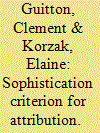

|
|
|
|
|
| Publication |
2013.
|
| Summary/Abstract |
In the wake of Stuxnet, there has been an increasing tendency on the part of politicians and analysts to see the sophistication of a cyber-attack as an indication of its perpetrator. Indeed, the more sophisticated the attack, the more sophisticated the attacker, thereby pointing to a state actor as the culprit - or so it is argued. However, Clement Guitton and Elaine Korzak note the lack of clarity and inconsistency around the term 'sophistication', contending that it is context-dependent and therefore that it cannot be used unquestioningly in identifying the perpetrator of a cyber-attack.
|
|
|
|
|
|
|
|
|
|
|
|
|
|
|
|
| 10 |
ID:
122264
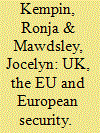

|
|
|
|
|
| Publication |
2013.
|
| Summary/Abstract |
While German commentators and politicians are primarily concerned with the economic impact of a possible 'Brexit' and the loss of a partner in EU economic negotiations, David Cameron's speech has also raised questions about the future of European security. For some in Berlin, the CSDP is unworkable without British participation; for others, the removal of the British veto would enable progress on CSDP institutions, long desired by Berlin. Here, Kempin and Mawdsley explore the apparent contradictions in German security policy, and the (possibly unwelcome) opportunities a Brexit might open up for Germany in relation to the CSDP.
|
|
|
|
|
|
|
|
|
|
|
|
|
|
|
|
|
|
|
|
|